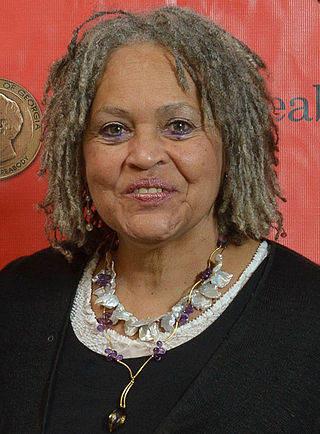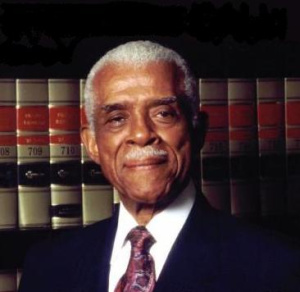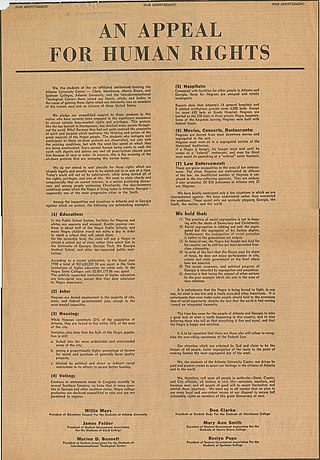Related Research Articles

Hamilton E. Holmes was an American orthopedic physician. He and Charlayne Hunter-Gault were the first two African-American students admitted to the University of Georgia. Additionally, Holmes was the first African-American student to attend the Emory University School of Medicine, where he earned his M.D. degree in 1967, later becoming a professor of orthopedics and associate dean at the school.

Alberta Charlayne Hunter-Gault is an American civil rights activist, journalist and former foreign correspondent for National Public Radio, CNN, and the Public Broadcasting Service. Charlayne Hunter and Hamilton Holmes were the first African-American students to attend the University of Georgia.

Horace Julian Bond was an American social activist, leader of the civil rights movement, politician, professor, and writer. While he was a student at Morehouse College in Atlanta, Georgia, during the early 1960s, he helped establish the Student Nonviolent Coordinating Committee (SNCC). In 1971, he co-founded the Southern Poverty Law Center in Montgomery, Alabama, and served as its first president for nearly a decade.

Ralph Emerson McGill was an American journalist and editorialist. An anti-segregationist editor, he published the Atlanta Constitution newspaper. He was a member of the Peabody Awards Board of Jurors, serving from 1945 to 1968. He won a Pulitzer Prize for editorial writing in 1959.

Donald Lee Hollowell was an American civil rights attorney during the Civil Rights Movement, in the state of Georgia. He successfully sued to integrate Atlanta's public schools, Georgia colleges, universities and public transit, freed Martin Luther King Jr. from prison, and mentored civil rights attorneys. The first black regional director of a federal agency, Hollowell is best remembered for his instrumental role in winning the desegregation of the University of Georgia in 1961. He is the subject of a 2010 documentary film, Donald L. Hollowell: Foot Soldier for Equal Justice.
The National Association of Black Journalists (NABJ) is a 501(c)3 nonprofit educational and professional organization of African-American journalists, students, and media professionals. Founded in 1975 in Washington, D.C., by 44 journalists, the NABJ's stated purpose is to provide quality programs and services to and advocate on behalf of black journalists. The organization has worked for diversity and to increase the number of minorities in newsrooms across the country.
The Grady College of Journalism and Mass Communication is a constituent college of the University of Georgia in Athens, Georgia, United States. Established in 1915, Grady College offers undergraduate degrees in journalism, advertising, public relations, and entertainment and media studies, and master's and doctoral programs of study. Grady has consistently been ranked among the top schools of journalism education and research in the U.S.
The Atlanta Student Movement was formed in February 1960 in Atlanta by students of the campuses Atlanta University Center (AUC). It was led by the Committee on the Appeal for Human Rights (COAHR) and was part of the Civil Rights Movement.

An Appeal for Human Rights is a civil rights manifesto initially printed as an advertisement in Atlanta newspapers on March 9, 1960 that called for ending racial inequality in Atlanta, Georgia, United States. The manifesto was written by students of Atlanta's six historically black colleges and universities that comprise the Atlanta University Center. It was drafted by Roslyn Pope and other students of the Atlanta University Center after the students, led by Lonnie King and Julian Bond, were encouraged by the six presidents of the Atlanta University Center to draft a document stating their goals. The students, organized as the Committee on Appeal for Human Rights (COAHR), published An Appeal for Human Rights working within and as part of the Civil Rights Movement.

Valerie Boyd was an American writer and academic. She was best known for her biography of Zora Neale Hurston entitled Wrapped in Rainbows: The Life of Zora Neale Hurston. She was an associate professor and the Charlayne Hunter-Gault Distinguished Writer-in-Residence at the Grady College of Journalism and Mass Communication at the University of Georgia, where she taught narrative nonfiction writing, as well as arts and literary journalism.

The Henry Grady Hotel was a hotel in downtown Atlanta, Georgia, United States. The building, designed by architect G. Lloyd Preacher, was completed in 1924 at the intersection of Peachtree Street and Cain Street, on land owned by the government of Georgia that had previously been occupied by the official residence of the governor. The hotel, which was named after journalist Henry W. Grady, was owned by the state and leased to operators. During the mid-1900s, the hotel typically served as the residence of state legislators during the legislative sessions, and it was an important location for politicking, with President Jimmy Carter later saying, "[m]ore of the state's business was probably conducted in the Henry Grady than in the state capitol". In the late 1960s, the government decided to not renew the building's lease when it expired in 1972, and it was demolished that year. The land was sold to developers and the Peachtree Plaza Hotel was built on the site. At the time of its completion in 1976, it was the tallest hotel building in the world.

The Baltimore Afro-American, commonly known as The Afro or Afro News, is a weekly African-American newspaper published in Baltimore, Maryland. It is the flagship newspaper of the AFRO-American chain and the longest-running African-American family-owned newspaper in the United States, established in 1892.
The Savannah Tribune is a weekly African-American newspaper published in Savannah, Georgia.

Samuel Woodrow Williams was a Baptist minister, professor of philosophy and religion, and Civil Rights activist. Williams was born on February 12, 1912, in Sparkman then grew up in Chicot County, Arkansas. An African American, Williams attended Morehouse College where he received his bachelor's degree in philosophy and later attended Howard University earning his master's degree in divinity.
The Chicago Conservator was an American newspaper. Founded by attorney Ferdinand Barnett in 1878, it was the first African-American newspaper in Chicago.
Herchelle Sullivan Challenor is a foreign policy expert, international civil servant, university administrator, and was one of the key activists in the Atlanta Student Movement, part of the Civil Rights Movement, of the early 1960s.

Freedom was a monthly newspaper focused on African-American issues published from 1950 to 1955. The publication was associated primarily with the internationally renowned singer, actor and then officially disfavored activist Paul Robeson, whose column, with his photograph, ran on most of its front pages. Freedom's motto was: "Where one is enslaved, all are in chains!" The newspaper has been described as "the most visible African American Left cultural institution during the early 1950s." In another characterization, "Freedom paper was basically an attempt by a small group of black activists, most of them Communists, to provide Robeson with a base in Harlem and a means of reaching his public... The paper offered more coverage of the labor movement than nearly any other publication, particularly of the left-led unions that were expelled from the CIO in the late 1940s... [It] encouraged its African American readership to identify its struggles with anti-colonial movements in Africa, Asia, and the Caribbean. Freedom gave extensive publicity to... the struggle against apartheid."
The Atlanta sit-ins were a series of sit-ins that took place in Atlanta, Georgia, United States. Occurring during the sit-in movement of the larger civil rights movement, the sit-ins were organized by the Committee on Appeal for Human Rights, which consisted of students from the Atlanta University Center. The sit-ins were inspired by the Greensboro sit-ins, which had started a month earlier in Greensboro, North Carolina with the goal of desegregating the lunch counters in the city. The Atlanta protests lasted for almost a year before an agreement was made to desegregate the lunch counters in the city.
The University of Georgia desegregation riot was an incident of mob violence by proponents of racial segregation on January 11, 1961. The riot was caused by segregationists' protest over the desegregation of the University of Georgia (UGA) in Athens, Georgia following the enrollment of Hamilton E. Holmes and Charlayne Hunter, two African American students. The two had been admitted to the school several days earlier following a lengthy application process that led to a court order mandating that the university accept them. On January 11, several days after the two had registered, a group of approximately 1,000 people conducted a riot outside of Hunter's dormitory. In the aftermath, Holmes and Hunter were suspended by the university's dean, though this suspension was later overturned by a court order. Several rioters were arrested, with several students placed on disciplinary probation, but no one was charged with inciting the riot. In an investigation conducted by the Federal Bureau of Investigation, it was revealed that some of the riot organizers were in contact with elected state officials who approved of the riot and assured them of immunity for conducting the riot.
Roy Vincent Harris was an American politician and newspaper publisher in the U.S. state of Georgia during the mid-1900s. From the 1920s until the 1940s, Harris served several terms in both the Georgia House of Representatives and the Georgia State Senate, and he served as the speaker of the house from 1937 to 1940 and again from 1943 to 1946. Historian Harold Paulk Henderson has called Harris "one of Georgia's most capable behind-the-scenes politicians".
References
- ↑ Range, Peter Ross (1974-04-07). "Making it in Atlanta". The New York Times. ISSN 0362-4331 . Retrieved 2019-10-31.
- ↑ Carson, Clayborne (1990). The student voice 1960-1965: periodical of the Student Nonviolent Coordinating Committee. Meckler. ISBN 0-88736-323-7. OCLC 477165543.
- 1 2 3 Bohannon, Jeanne Law (9 July 2017). "Dr. Lonnie King Class Lecture 2017". hdl:11360/2403.
- 1 2 Hunter-Gault, Charlayne (14 January 2014). To the mountaintop: my journey through the civil rights movement. Square Fish. ISBN 978-1-250-04062-6. OCLC 829452587.
- 1 2 Brown-Nagin, Tomiko (2011-02-09). Courage to Dissent. Oxford University Press. doi:10.1093/acprof:osobl/9780195386592.001.0001. ISBN 978-0-19-538659-2.
- ↑ Hornsby, Jr., Alton (1983). "Georgia". In Suggs, Henry Lewis (ed.). The Black press in the South, 1865-1979. Westport, Connecticut: Greenwood Press. p. 138. ISBN 0-313-22244-4.
Nevertheless, it is clear that the World's "conservative" approach to black protest demonstrations in Atlanta during the 1960s was a turning point in the history of black journalism in the city. As a direct result of the World's position, the first new successful newspaper in 32 years was established in the black community.
- ↑ Smith, John B. Sr.; Jefferson, Karen (1 December 2015). "John B. Smith, Sr. Oral History Interview, December 1, 2015". RADAR. Atlanta University Center Robert W. Woodruff Library. hdl:20.500.12322/auc.198:0001 . Retrieved 11 May 2023.